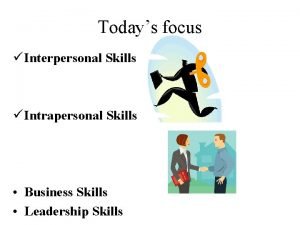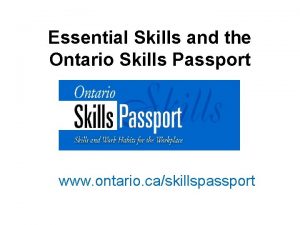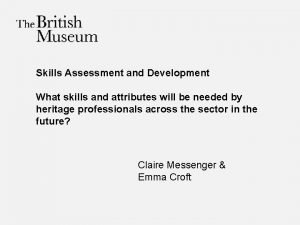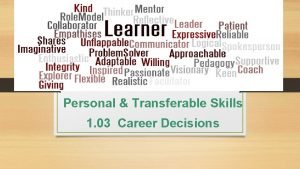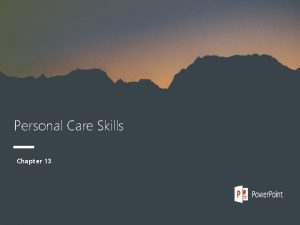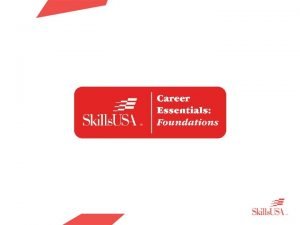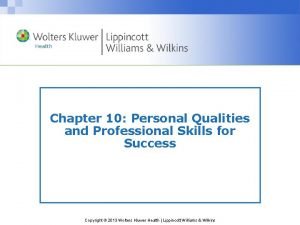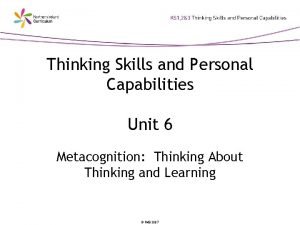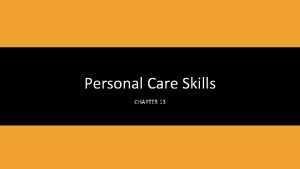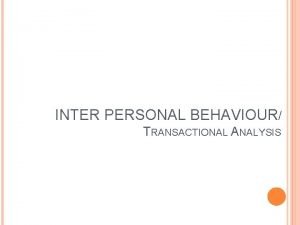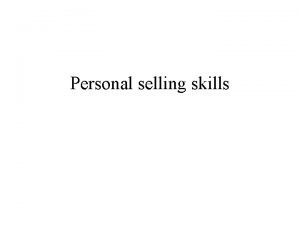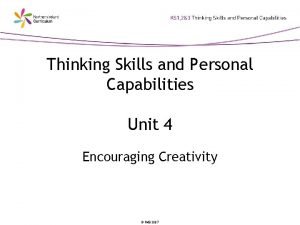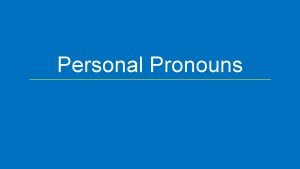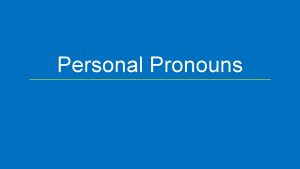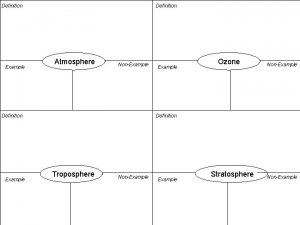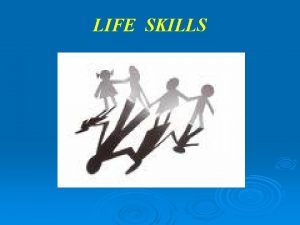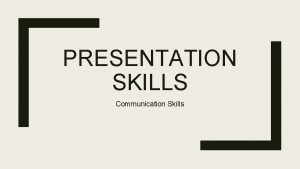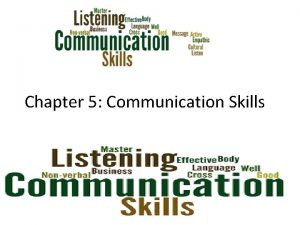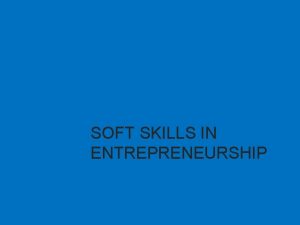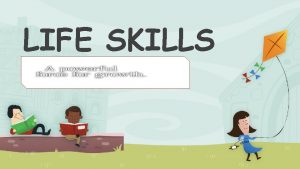Personal Skills Personal Skills Definition of personal skills















- Slides: 15

Personal Skills

Personal Skills Definition of personal skills The ability to reflect on internal concepts such as emotion, cognition and one’s own identity. EMOTION & EMOTION REGULATION COGNITION IDENTIFYING BARRIERS & RESOURCES IDENTITY & SELF-ESTEEM

Personal Skills The aim of personal skills activities • to reflect on each skill and competence and be aware of each component and process that occurs in the intrapersonal dimension • to expand into experience of the world outside (family, ethnic group etc. ) • to develop an independent identity which are aligned with the personal abilities

Personal Skills Personal skills in a synthetic way • Emotions & emotion regulation: ability to perceive and express one’s own feelings; • Cognition: self-reflection; realistic self-evaluation; problemsolving ability; ability to perceive one’s own desires and longings; identifying barriers and resources; setting goals; taking decisions; • Identity & self-esteem, self-confidence; identify values and beliefs

Personal Skills The importance of personal skills for socially unprivileged individuals “Socially unprivileged individuals are people that don’t get and keep the recognition of their rights from the material to the cultural ones, and don’t have the acknowledgement of their potential and ability, whatever they are. “ “This unprivileged situation is given by a complex of factors and from their interaction, that place obstacles to the social inclusion of those people. ( O. De Leonardis 2000). ”

Personal Skills Psychological aspects that affect some unprivileged individuals • They perceive themselves as powerless. • They suffer a low self esteem and self efficacy. • They can have several resources that are not acknowledged because of the ethnic and cultural differences.

Personal Skills Starting a personal changing process requires: • MOTIVATION • DEFINITION OF NEEDS AND DESIRES

Personal Skills Personal skills are an important resources for leading a healthy life Health promotion approach implies improvement and enhancement of the individual capacities and their communities to manage their life and health conditions by coping with problems and crisis situation in the social context and in everyday life.

Personal Skills Difference between working on personal skills and therapeutic approach • it is important to look towards the future (from todays point in time forward) and not to look back into the past • it is asumed that person is capable and not disable

Personal Skills Properly managing personal skills can encourage communication of ones deep intimacy, traumatic personal history… • The group leader must be able to handle situations that can cause an reaction such as over exposion of individual emotions. • The group leader must be able to create appropriate interventions.

Personal Skills Methodology • direct and personal engagement of each participant in an active session • group work and exchange process Sometimes methods are best laid aside: • just be beside participants for a support • human to human contact

Personal Skills Group work with personal skills Working in groups encourages each participant to get involved into his/her unique experience to discover and express himself/herself and to share some important personal experience and personal story. The group leader must pay attention to: • atmosphere (confidence, security, relaxing, friendly) • relationship (create situation that can open relationship) • graduality (respecting personal time) • circularity (the same time and possibility to express to each participant)

Personal Skills Positive effects of the group work • • • individuals can practice new skills build or rebuild trust in other people develop abilities to help others decrease isolation learn factual information from other members corrective recapitulation of the previous experiences

Personal Skills Active method During the training session each participant can have the opportunity to try effectively his personal skills in concrete behaviours that can be observed and regulated (for example: express emotion, solve problems, take decision). Use of specific techniques and activities that facilitate self expression: drawing, painting, dancing, drama playing.

Personal Skills Active methodology can assure the principles of Pro-Skills approach • Participation: Each participant can freely choose the level and intensity of involvment. • Empowerment: Each participant has the possibility to give his feedback, evaluate the activity and express needs and motivation. • Wellbeing: Expressing in a protective situation in the group creates possibility to observe their situation from a different angle, recognizing resources and potentiality.
 Intrapersonal and interpersonal difference
Intrapersonal and interpersonal difference What is soft skills
What is soft skills Ontario skills passport
Ontario skills passport Personal skills and abilities
Personal skills and abilities Personal transferable skills
Personal transferable skills What is personal selling
What is personal selling Chapter 13 personal care skills
Chapter 13 personal care skills Personal skills and abilities
Personal skills and abilities Personal selling skills
Personal selling skills Professional and personal qualities
Professional and personal qualities Personal care skills chapter 13
Personal care skills chapter 13 Thinking skills and personal capabilities
Thinking skills and personal capabilities Chapter 13 personal care skills
Chapter 13 personal care skills Interpersonal vs transactional
Interpersonal vs transactional Elements of communication process
Elements of communication process Icedip model full form
Icedip model full form
